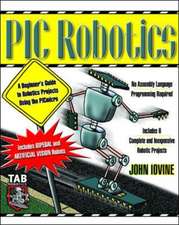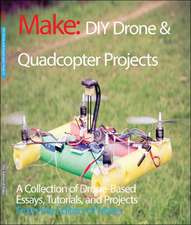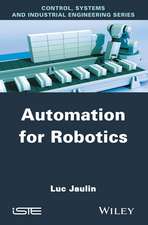Fractional Order Darwinian Particle Swarm Optimization: Applications and Evaluation of an Evolutionary Algorithm: SpringerBriefs in Applied Sciences and Technology
Autor Micael Couceiro, Pedram Ghamisien Limba Engleză Paperback – 26 iun 2015
Din seria SpringerBriefs in Applied Sciences and Technology
-
 Preț: 380.29 lei
Preț: 380.29 lei - 17%
 Preț: 360.33 lei
Preț: 360.33 lei - 20%
 Preț: 386.11 lei
Preț: 386.11 lei -
 Preț: 380.07 lei
Preț: 380.07 lei -
 Preț: 377.95 lei
Preț: 377.95 lei -
 Preț: 382.32 lei
Preț: 382.32 lei -
 Preț: 376.59 lei
Preț: 376.59 lei -
 Preț: 379.09 lei
Preț: 379.09 lei -
 Preț: 378.12 lei
Preț: 378.12 lei - 20%
 Preț: 293.83 lei
Preț: 293.83 lei -
 Preț: 344.90 lei
Preț: 344.90 lei -
 Preț: 321.35 lei
Preț: 321.35 lei -
 Preț: 264.79 lei
Preț: 264.79 lei -
 Preț: 344.90 lei
Preț: 344.90 lei -
 Preț: 356.45 lei
Preț: 356.45 lei -
 Preț: 382.95 lei
Preț: 382.95 lei -
 Preț: 355.65 lei
Preț: 355.65 lei -
 Preț: 479.67 lei
Preț: 479.67 lei -
 Preț: 415.18 lei
Preț: 415.18 lei -
 Preț: 444.52 lei
Preț: 444.52 lei - 20%
 Preț: 301.85 lei
Preț: 301.85 lei -
 Preț: 409.43 lei
Preț: 409.43 lei - 20%
 Preț: 322.17 lei
Preț: 322.17 lei -
 Preț: 355.48 lei
Preț: 355.48 lei - 15%
 Preț: 462.51 lei
Preț: 462.51 lei -
 Preț: 377.18 lei
Preț: 377.18 lei -
 Preț: 355.92 lei
Preț: 355.92 lei -
 Preț: 382.95 lei
Preț: 382.95 lei -
 Preț: 378.12 lei
Preț: 378.12 lei -
 Preț: 378.12 lei
Preț: 378.12 lei -
 Preț: 380.07 lei
Preț: 380.07 lei -
 Preț: 380.07 lei
Preț: 380.07 lei - 20%
 Preț: 326.28 lei
Preț: 326.28 lei -
 Preț: 312.68 lei
Preț: 312.68 lei -
 Preț: 356.42 lei
Preț: 356.42 lei -
 Preț: 412.30 lei
Preț: 412.30 lei - 20%
 Preț: 225.31 lei
Preț: 225.31 lei -
 Preț: 378.12 lei
Preț: 378.12 lei -
 Preț: 376.59 lei
Preț: 376.59 lei -
 Preț: 195.87 lei
Preț: 195.87 lei -
 Preț: 376.22 lei
Preț: 376.22 lei - 20%
 Preț: 324.64 lei
Preț: 324.64 lei - 20%
 Preț: 288.73 lei
Preț: 288.73 lei -
 Preț: 377.57 lei
Preț: 377.57 lei -
 Preț: 261.91 lei
Preț: 261.91 lei -
 Preț: 381.98 lei
Preț: 381.98 lei -
 Preț: 273.63 lei
Preț: 273.63 lei -
 Preț: 410.85 lei
Preț: 410.85 lei -
 Preț: 379.68 lei
Preț: 379.68 lei -
 Preț: 374.30 lei
Preț: 374.30 lei
Preț: 322.17 lei
Preț vechi: 402.72 lei
-20% Nou
Puncte Express: 483
Preț estimativ în valută:
61.65€ • 64.54$ • 51.01£
61.65€ • 64.54$ • 51.01£
Carte tipărită la comandă
Livrare economică 05-19 aprilie
Preluare comenzi: 021 569.72.76
Specificații
ISBN-13: 9783319196343
ISBN-10: 3319196340
Pagini: 75
Ilustrații: X, 75 p. 27 illus., 24 illus. in color.
Dimensiuni: 155 x 235 x 7 mm
Greutate: 0.14 kg
Ediția:2016
Editura: Springer International Publishing
Colecția Springer
Seria SpringerBriefs in Applied Sciences and Technology
Locul publicării:Cham, Switzerland
ISBN-10: 3319196340
Pagini: 75
Ilustrații: X, 75 p. 27 illus., 24 illus. in color.
Dimensiuni: 155 x 235 x 7 mm
Greutate: 0.14 kg
Ediția:2016
Editura: Springer International Publishing
Colecția Springer
Seria SpringerBriefs in Applied Sciences and Technology
Locul publicării:Cham, Switzerland
Public țintă
ResearchCuprins
Particle Swarm Optimization (PSO).- Fractional Order Darwinian PSO (FODPSO).- Case Study I: Curve Fitting.- Case Study II: Image Segmentation.- Case Study III: Swarm Robotics.- Conclusions.
Notă biografică
Dr. Micael Couceiro obtained his BSc, Teaching Licensure and Master degrees on Electrical Engineering (Automation and Communications), at the Coimbra School of Engineering (ISEC), Coimbra Polytechnic Institute (IPC). He obtained his PhD degree on Electrical and Computer Engineering (Automation and Robotics) at the Faculty of Sciences and Technology of University of Coimbra (FCTUC), under a PhD Grant from the Portuguese Foundation for Science and Technology. Over the past 6 years, he has been conducting scientific research on several areas, namely robotics, computer vision, sports engineering, and others, all at the Institute of Systems and Robotics (ISR-FCTUC) and RoboCorp (IPC). This resulted in more than 25 scientific articles in international impact factor journals and more than 50 scientific articles at international conferences. Besides being currently a researcher at ISR, he has been invited for lecturing, tutoring and organization of events (e.g., professional courses, national and international conferences, among others), both in the public and private domains. He is co-founder and currently the CEO of Ingeniarius.
Pedram Ghamisi graduated with a B.Sc. degree in Civil (Survey) Engineering from the Tehran South Campus of Azad University. Then, he obtained the M.Sc. degree with first Class Honours in Remote Sensing at K.N.Toosi University of Technology in 2012. He received the Best Researcher Award for M.Sc. students in K.N.Toosi University of Technology in the academic year 2010-2011. At the 2013 IEEE International Geoscience and Remote Sensing Symposium (IGARSS), Melbourne, July 2013, Mr. Ghamisi was awarded the IEEE Mikio Takagi Prize, for winning the Student Paper Competition at the conference between almost 70 people. He obtained his PhD degree on Electrical and Computer Engineering at the University of Iceland in 2015. His research interests are image processing, soft computing, pattern recognition and remote sensing with the current focus on spectral and spatial techniques for hyperspectral image classification and the integration of LiDAR and hyperspectral data for land cover assessment, and he has published extensively in those fields. He serves as a reviewer for a number of journals including IEEE Trans. on Image Processing, IEEE Trans. on Geoscience and Remote Sensing, IEEE JSTARS, IEEE GRSL and Pattern Recognition Letters.
Pedram Ghamisi graduated with a B.Sc. degree in Civil (Survey) Engineering from the Tehran South Campus of Azad University. Then, he obtained the M.Sc. degree with first Class Honours in Remote Sensing at K.N.Toosi University of Technology in 2012. He received the Best Researcher Award for M.Sc. students in K.N.Toosi University of Technology in the academic year 2010-2011. At the 2013 IEEE International Geoscience and Remote Sensing Symposium (IGARSS), Melbourne, July 2013, Mr. Ghamisi was awarded the IEEE Mikio Takagi Prize, for winning the Student Paper Competition at the conference between almost 70 people. He obtained his PhD degree on Electrical and Computer Engineering at the University of Iceland in 2015. His research interests are image processing, soft computing, pattern recognition and remote sensing with the current focus on spectral and spatial techniques for hyperspectral image classification and the integration of LiDAR and hyperspectral data for land cover assessment, and he has published extensively in those fields. He serves as a reviewer for a number of journals including IEEE Trans. on Image Processing, IEEE Trans. on Geoscience and Remote Sensing, IEEE JSTARS, IEEE GRSL and Pattern Recognition Letters.
Caracteristici
Contributes to the state-of-the-art on the use of swarm intelligence to solve real-world problems Compares the capabilities of various bio-inspired optimization approaches Demonstrates the superiority of the Fractional Order Darwinian Particle Swarm Optimization (FODPSO) algorithm Includes supplementary material: sn.pub/extras










